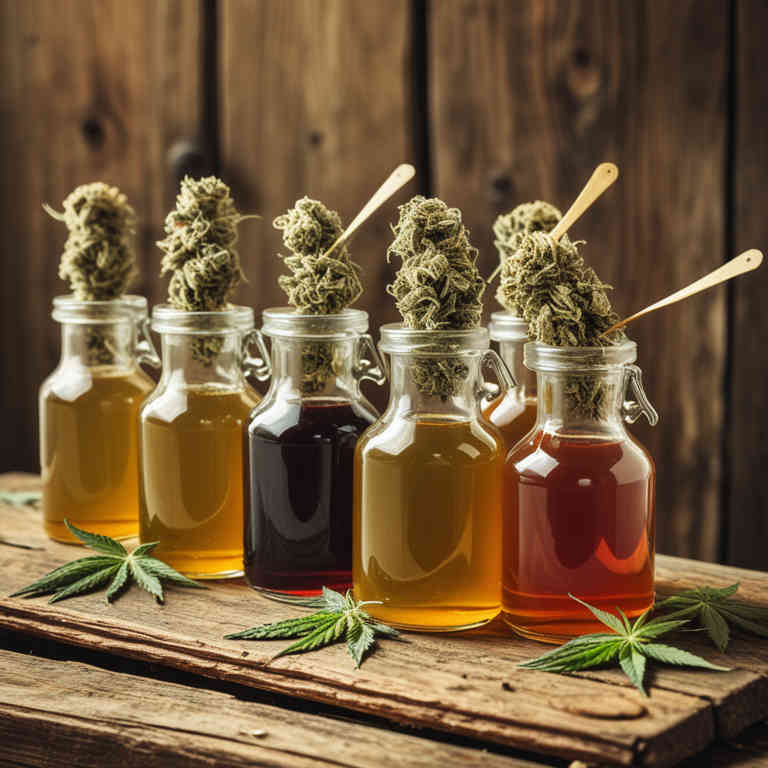Cannabis sativa syrup for medicinal use

Cannabis sativa syrup is a herbal preparation made by extracting cannabinoids and other active compounds from the Cannabis sativa plant and dissolving them in a sweetened syrup base.
It is traditionally used in herbalism to address conditions such as chronic pain, inflammation, and anxiety due to its potential therapeutic properties. The syrup is often preferred for its ease of consumption and faster absorption compared to other forms of cannabis. It is typically prepared using methods like alcohol extraction or steam distillation to preserve the plant's active constituents.
In some regions, it is used as a complementary therapy under the guidance of a qualified herbalist or healthcare provider.
Uses
Cannabis sativa syrup has been used to treat a variety of ailments across different cultures and time periods.
Historically, it was employed in traditional medicine systems such as Chinese and Ayurvedic practices for its purported ability to alleviate pain, reduce inflammation, and promote relaxation. In modern times, it has gained attention for its potential therapeutic benefits, including managing chronic pain, anxiety, and insomnia, often due to its cannabidiol (CBD) content. However, its use remains controversial due to legal restrictions and varying scientific evidence regarding its efficacy and safety.
Despite these challenges, some individuals and alternative medicine practitioners continue to explore its potential as a natural remedy.
Benefits
Cannabis sativa syrup has health benefits such as reducing inflammation, alleviating chronic pain, and improving sleep quality.
It contains cannabinoids like CBD and THC, which interact with the body's endocannabinoid system to promote balance and well-being. This preparation may also help manage symptoms of anxiety and epilepsy when used under medical supervision. Its soothing properties make it a popular choice for those seeking natural remedies for various health conditions.
However, it is important to consult a healthcare professional before use to ensure safety and appropriateness for individual health needs.
Constituents
Cannabis sativa syrup active constituents include cannabinoids such as tetrahydrocannabinol (THC) and cannabidiol (CBD), as well as terpenes and flavonoids.
These compounds interact with the body's endocannabinoid system to produce various therapeutic effects. THC is known for its psychoactive properties and pain-relieving capabilities, while CBD offers anti-inflammatory and anxiety-reducing benefits without causing intoxication. The terpenes contribute to the overall aroma and may enhance the therapeutic profile through the entourage effect.
This preparation is often used for managing chronic pain, inflammation, and neurological conditions under medical supervision.
Preparation
To make Cannabis sativa syrup, you will need cannabis flowers or buds, a simple syrup base made from sugar and water, and a method to extract the cannabinoids.
Begin by decarboxylating the cannabis by baking it at 225°F (107°C) for 30-45 minutes to activate the THC. Then, mix the decarboxylated cannabis with the simple syrup and let it steep for 4-6 hours. Strain the mixture through a fine mesh strainer or cheesecloth to remove plant material.
Finally, store the syrup in a dark glass bottle in the refrigerator, where it will keep for up to two weeks.
Side Effects
Cannabis sativa syrup may lead to a range of potential health effects, depending on the dosage and individual tolerance.
It is often used for its potential therapeutic properties, such as pain relief and relaxation. However, it can also cause side effects such as drowsiness, dry mouth, and impaired coordination. Long-term use may lead to dependency or mental health issues like anxiety and depression.
It is important to consult a healthcare professional before using this preparation to ensure safety and appropriate dosage.